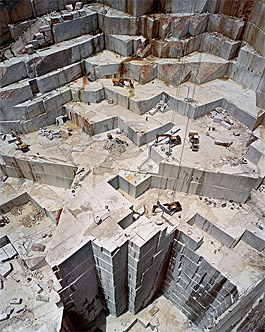
In Italian Carrara, marble mining is passed down from father to son
 |
"I have 24 employees, all men. It is a hard and dangerous profession; you won't find any women in the quarry," says Franco Petacchi, a fifty-year-old concessionaire of one of the quarries, according to AFP. His grandfather was a capo cava, the head of mining in a quarry, his father a concessionaire, and Franco continues in their footsteps.
"Look at that statue at the entrance of the quarry; that is my uncle; he died in an accident," he says.
In the closed world of extracting the famous white Carrara marble, few are those who do not have a victim in their family, although safety standards have been considerably strengthened over time.
"We cannot work when it's too cold, or when it's too hot, when it rains or when there are strong winds. So in a year, we work 160 to 170 days," says Petacchi.
Fifty-two-year-old Alvise Lazzareschi lost his brother in a quarry accident. He comes from a family of Tuscan nobility, and his ancestors have been mining marble for five centuries.
"Marble quarrying is the only activity in Italy where there are not only no women but also no foreigners," emphasizes Alvise.
"There is no school where you can learn this profession. You take it on as a child when your father comes home cursing the rock for cracking in the wrong place," explains Alvise.
Unlike marble processing, which is experiencing hard times in the Carrara area, the extraction is doing well. It holds at about one million tons out of four to five million tons of mined material annually.
Despite these impressive numbers, Lazzareschi confidently claims that the end of the world will come sooner than Carrara marble is exhausted.
However, this raw material does not bring happiness to everyone, even though the municipality collects 15 million euros (390 million crowns) a year in taxes and concession fees from it.
"Every day, around 1000 trucks pass through the city to the port, and the residents are dissatisfied," says industry expert Antonio Chiappini. He clarifies that a new road is planned to bypass the center.
The processing of the famous Carrara marble, one of the symbols of Italian luxury, has been severely hit by the crisis and competition from countries like China and Brazil. This has forced many craftsmen to close their workshops.
"Marble processing and other materials like granite are going through a tough crisis. China, but also India and Brazil, have invested in tools for processing marble and granite, and now they process their production themselves instead of sending it to Carrara as before," says Roberto Dell'Amico, owner of a workshop in Carrara that his father opened 45 years ago.
"Twenty or thirty years ago, a large part of the world's production of marble or granite was processed in Carrara, but today that is no longer the case," continues Roberto, whose workshop has reduced its number of workers from 18 to 13 in the last ten years.
Export of finished marble products fell by 16 percent last year compared to 2008, and granite by 27 percent. According to unions, 2000 people have lost their jobs in the sector in recent years.
Brazil, a major granite producer, now processes its blocks independently, at more favorable prices, and exports them directly, for example, to the United States.
"We must export our skill. We can never surpass the Chinese in quantity, but we can compete with them in processing due to our craftsmen, who often work the material by hand," concludes Dell'Amico.
The English translation is powered by AI tool. Switch to Czech to view the original text source.
0 comments
add comment










